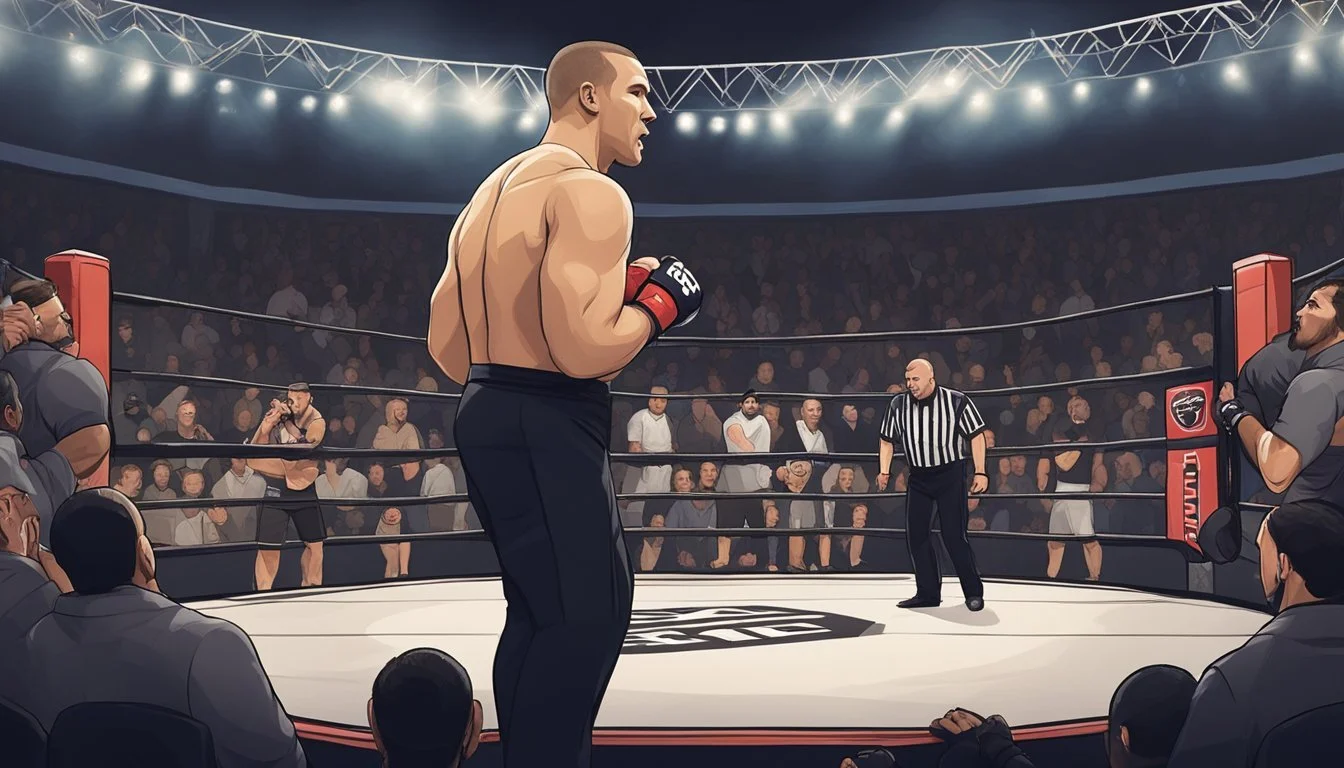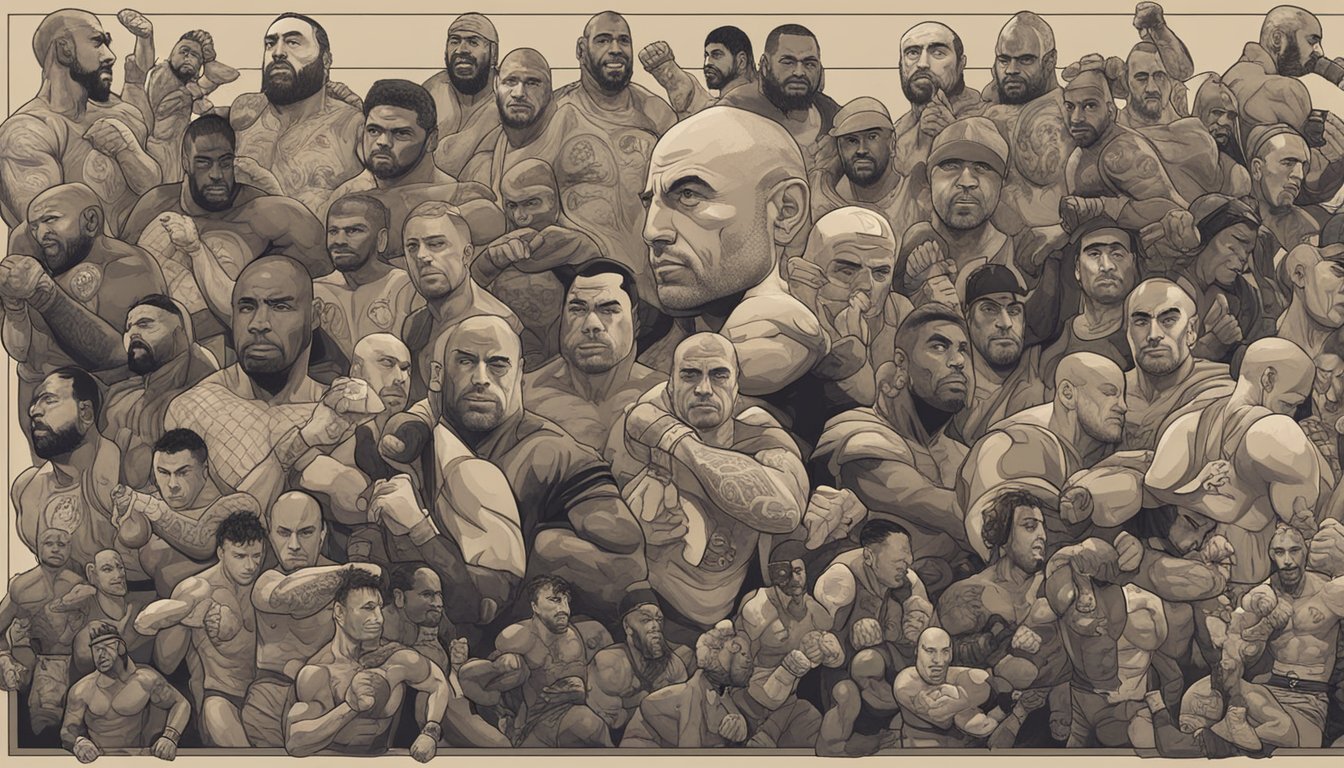Examining Joe Rogans Martial Arts Competition History
MMA and Taekwondo Career Highlights
Joe Rogan, a prominent figure in the entertainment and sports world, is known for his diverse career as a podcaster, comedian, actor, and UFC commentator. Many fans wonder about his fighting background, given his extensive knowledge of martial arts and his role in the UFC.
Joe Rogan has never fought professionally in Mixed Martial Arts (MMA), resulting in an official MMA record of 0-0. Despite this, Rogan's martial arts experience is substantial. He was a four-time Taekwondo state champion and competed in kickboxing, accumulating a 2-1 record.
Rogan's martial arts expertise extends beyond competition. He holds black belts in Brazilian Jiu-Jitsu and 10th Planet Jiu-Jitsu, and has trained in Muay Thai. This background has undoubtedly contributed to his success as a UFC commentator, where he provides insightful analysis of fights and techniques.
Early Life and Martial Arts Background
Joe Rogan's journey in martial arts began at a young age in Newark, New Jersey. His early experiences shaped his future career and passion for combat sports.
Taekwondo State Champion
Rogan started practicing Taekwondo at age 13. He quickly excelled in the discipline, dedicating himself to rigorous training. By 15, he competed in state-level tournaments.
Rogan's talent and hard work paid off. He won the Massachusetts state championship in Taekwondo for four consecutive years. This achievement established him as a formidable martial artist.
His success in Taekwondo competitions laid the foundation for his future involvement in combat sports. Rogan also briefly competed in amateur kickboxing, further honing his striking skills.
Transition to Brazilian Jiu-Jitsu
In his early twenties, Rogan discovered Brazilian Jiu-Jitsu. He was immediately captivated by its effectiveness and technical depth. Rogan began training under Carlson Gracie Sr., a legendary figure in the art.
Rogan's dedication to BJJ was intense. He trained consistently, often multiple times a day. His background in Taekwondo provided a solid base for learning grappling techniques.
Over time, Rogan earned his black belt in BJJ under Eddie Bravo's 10th Planet Jiu-Jitsu system. This achievement further solidified his status as a well-rounded martial artist.
Martial Arts Career
Joe Rogan's martial arts journey spans decades, encompassing various disciplines and competitive experiences. His dedication to combat sports has shaped his career both inside and outside the ring.
Kickboxing Achievements
Rogan began his martial arts training at age 14, initially focusing on Taekwondo. He excelled quickly, becoming a four-time full-contact Taekwondo state champion in Massachusetts. His striking prowess led him to explore kickboxing, where he competed professionally.
In kickboxing, Rogan compiled a record of 2 wins and 1 loss. His victories showcased his powerful striking skills and technical proficiency. Despite a promising start, Rogan chose to step away from competitive kickboxing due to concerns about potential head injuries.
MMA Training and Experience
While Rogan never competed professionally in MMA, he immersed himself in various martial arts disciplines. He earned black belts in Brazilian Jiu-Jitsu under Jean Jacques Machado and in 10th Planet Jiu-Jitsu under Eddie Bravo.
Rogan's MMA training includes both striking and grappling elements. He regularly practices with professional fighters and coaches, honing his skills in boxing, Muay Thai, and wrestling. This comprehensive approach allows him to understand the intricacies of MMA techniques.
His extensive martial arts background has been instrumental in his role as a UFC commentator. Rogan's technical knowledge and passion for combat sports have made him a respected voice in the MMA community.
Ultimate Fighting Championship (UFC) Career
Joe Rogan's involvement with the UFC spans over two decades, encompassing multiple roles that have significantly impacted the organization's growth and popularity. His expertise in martial arts and engaging commentary style have made him an integral part of UFC broadcasts.
UFC Commentary and Analysis
Rogan began his UFC career at UFC 12 in 1997, initially serving as a backstage interviewer. He quickly transitioned to color commentary, where his deep knowledge of martial arts and ability to break down complex techniques became evident. Rogan's commentary style blends technical analysis with enthusiasm, making fights more accessible to casual viewers while satisfying hardcore fans.
His insights often focus on grappling exchanges, submission attempts, and striking techniques. Rogan's ability to predict fight outcomes and explain strategic nuances has earned him respect among fighters and fans alike.
Backstage Interviews and Fighter Insights
As a backstage interviewer, Rogan developed a rapport with UFC fighters that continues to this day. His pre-fight and post-fight interviews often reveal unique insights into fighters' mindsets and strategies. Rogan's martial arts background allows him to ask insightful questions that elicit meaningful responses from competitors.
These interviews have become a staple of UFC broadcasts, providing viewers with valuable context and behind-the-scenes perspectives. Rogan's ability to connect with fighters has resulted in many memorable moments and candid revelations over the years.
Influence on UFC Popularity
Rogan's impact on the UFC's popularity cannot be overstated. His commentary and podcast, The Joe Rogan Experience, have introduced millions of new fans to the sport of MMA. By explaining complex techniques and strategies in an accessible manner, Rogan has helped demystify the sport for casual viewers.
His passion for martial arts is evident in his commentary, often generating excitement during key moments of fights. Rogan's presence has become synonymous with major UFC events, and his voice is instantly recognizable to fans worldwide. His contributions have played a significant role in the UFC's growth from a niche sport to a global entertainment phenomenon.
Entertainment Career
Joe Rogan's entertainment career spans stand-up comedy, acting, and television hosting. He gained fame as a comedian and actor before becoming the host of the popular reality show Fear Factor.
Comedy and Acting
Rogan began performing stand-up comedy in 1988 in Boston. His edgy humor and energetic stage presence quickly garnered attention. He moved to Los Angeles in 1994 to pursue comedy full-time. Rogan's first major acting role came in the NBC sitcom NewsRadio, where he played Joe Garrelli from 1995 to 1999.
His stand-up specials include "Joe Rogan: Live" (2006) and "Joe Rogan: Triggered" (2016). As an actor, Rogan appeared in films like "Zookeeper" (2011) and "Here Comes the Boom" (2012).
Television Hosting: Fear Factor
In 2001, Rogan became the host of Fear Factor on NBC. The show featured contestants performing dangerous stunts and eating unusual items for prize money. Rogan's witty commentary and ability to interact with contestants contributed to the show's popularity.
Fear Factor ran from 2001 to 2006 and was briefly revived in 2011, with Rogan returning as host. The show helped establish Rogan as a recognizable television personality and expanded his fan base beyond comedy circles.
The Joe Rogan Experience Podcast
The Joe Rogan Experience podcast has become a major platform for discussing martial arts and MMA. It features in-depth conversations with fighters, coaches, and other industry figures. The show also explores various combat techniques and training methods.
Interviews with MMA Personalities
Joe Rogan regularly hosts UFC fighters, coaches, and promoters on his podcast. These guests share insights into their careers, training regimens, and perspectives on the sport. Notable MMA personalities who have appeared include Royce Gracie, Dana White, and Georges St-Pierre.
Rogan's background as a UFC commentator allows for informed discussions on fight strategies and behind-the-scenes aspects of the MMA world. These interviews often reveal personal stories and career highlights that fans rarely hear elsewhere.
The podcast has featured champions from various weight classes, giving listeners a broad view of the UFC landscape. Retired fighters also appear, offering historical context and evolution of MMA techniques over time.
Discussions on Martial Arts Technique and Training
The Joe Rogan Experience delves into the technical aspects of various martial arts disciplines. Rogan, a black belt in Brazilian Jiu-Jitsu and Taekwondo, brings personal experience to these conversations.
Guests often demonstrate techniques on the show, providing visual explanations of complex moves. Discussions cover training methods for different martial arts, including Muay Thai, wrestling, and boxing.
The podcast explores the effectiveness of traditional martial arts in modern MMA contexts. It also addresses topics like injury prevention, weight cutting, and the mental aspects of combat sports.
Rogan frequently discusses the importance of cross-training in multiple disciplines for MMA success. These segments offer valuable insights for both aspiring fighters and martial arts enthusiasts.
Legacy and Influence
Joe Rogan's impact on mixed martial arts extends far beyond his role as a UFC commentator. His passion, knowledge, and communication skills have helped shape the sport's growth and inspired many.
Contribution to the Growth of MMA
Rogan's commentary and analysis have played a crucial role in educating fans about the intricacies of mixed martial arts. His ability to break down complex techniques and strategies has made the sport more accessible to newcomers.
As a podcast host, Rogan has provided a platform for fighters, coaches, and other MMA personalities to share their stories and insights. This has helped humanize athletes and create deeper connections between fans and the sport.
Rogan's enthusiasm for MMA has also attracted new audiences. His wide-reaching podcast has introduced many listeners to the world of mixed martial arts, contributing to its growing popularity.
Inspiration and Resilience
Despite never competing professionally in MMA, Rogan's martial arts background has earned him respect in the community. His dedication to training and continuous learning serves as an inspiration to many.
Rogan's journey from martial artist to commentator and influential figure demonstrates the value of persistence and adaptability. His willingness to embrace new challenges, like podcasting and stand-up comedy, showcases resilience.
His openness about personal struggles and commitment to self-improvement resonates with many fans. This transparency has helped create a sense of authenticity that contributes to his enduring influence in the MMA world.
Triumphs and Losses
Joe Rogan's martial arts journey encompasses notable achievements and learning experiences. His record reflects dedication to various disciplines and a willingness to face challenges.
Professional Wins and Achievements
Rogan excelled in Taekwondo, becoming a four-time full contact state champion. This accomplishment showcases his skill and competitiveness in striking arts. He also holds a black belt in Brazilian Jiu-Jitsu, demonstrating proficiency in both gi and no-gi techniques.
In kickboxing, Rogan compiled a 2-1 record. While brief, this competitive stint allowed him to test his abilities in a professional setting. His victories highlight his striking prowess and tactical acumen.
Rogan's martial arts expertise extends beyond competition. He earned widespread recognition as a UFC commentator, applying his knowledge to analyze fights and educate viewers.
Overcoming Challenges and Setbacks
Despite his successes, Rogan faced setbacks in his martial arts journey. Injuries forced him to reassess his path as a competitor. He experienced a loss in kickboxing, which likely provided valuable lessons in resilience and improvement.
Rogan's transition from active competitor to commentator presented its own hurdles. He had to adapt his communication style and deepen his analytical skills to excel in this new role.
His openness about past struggles, including with performance anxiety, has resonated with many fans. This transparency highlights the mental challenges inherent in martial arts competition and commentary.







